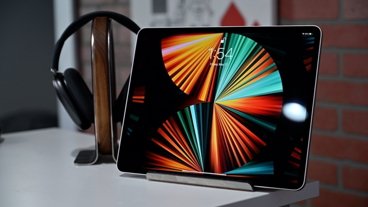Opening the door to true wireless sync for portable devices, Samsung has taken the wraps from the first handheld-sized processor with built-in support for the Wireless USB standard.
The system-on-a-chip implementation also has a built-in RAM controller as well as links for ordinary USB and could serve as a complete replacement CPU for devices that would otherwise need a cable to transfer large amounts of information across a short distance.
As it can shuttle a 700MB movie over the wireless link in about a minute, Samsung touts the technology as being fast enough for a typical data sync, multimedia streaming, and even for sharing data between similar devices. An MP3 player could beam its music through wireless speakers, for example, while a cellphone could share songs or videos between other compatible products.
Volume production of the chip should begin sometime during the second calendar quarter of the year.
It's not certain that Apple will ever use this particular chip for any future devices. Although the Cupertino, Calif.-based company regularly uses Samsung ARM chips for iPhone and iPod touch models, any implementation would need to both perform well and to have corresponding support on Apple computers; there's no sign yet that the Mac maker is ready to adopt Wireless USB for any system in its lineup.
Should Apple ever adopt some variant of the new processor, however, the invention would have sufficient transfer speed to let users sync entire iTunes libraries or to add peripherals that would otherwise need the performance of a full-fledged USB port. While companies have already experimented with automatic wireless updates, such as the Zune's Wi-Fi sync of its owner's library, these have often been deliberately limited only to transfers after the first sync, which is often too large for the relatively slow speeds of the 802.11g wireless links that are the norm on cellphones and other palm-sized gadgets.
 Aidan Malley
Aidan Malley






-m.jpg)






 Malcolm Owen
Malcolm Owen
 Amber Neely
Amber Neely


 Christine McKee
Christine McKee

 Chip Loder
Chip Loder
 Marko Zivkovic
Marko Zivkovic









17 Comments
Is it gonna work on Wi-Fi because most Wi-Fi networks limit speeds.
hmmm
Is it gonna work on Wi-Fi because most Wi-Fi networks limit speeds.
hmmm
I could be totally wrong here, but to my knowledge, wireless USB does not communicate with WiFi at all. Its setup is similar in theory to bluetooth in the sense that it's a direct wireless connection from two or more devices, but each device has to have a specific chip for wireless USB. The difference, though, is that this is much more versatile than bluetooth simply because it is WAY faster. 120Mbps over the air? That is insane, especially considering bluetooth's around 2Mbps (at best). Once this technology becomes cheap enough that every major electronic device has it, we may see the end of wires forever.
Wireless USB was originally a standard for a short-range UWB (ultra wideband) radio. Since its inception, it has never had a serious backer, partly due to regulation difficulty with the FCC. I have no idea what is the state of wireless USB except that as a standard it's in free fall. Until someone like Apple takes ahold of any given "wireless USB" chip and makes it the de facto definition, as a consumer I wouldn't touch wireless USB.
It's a weak standard. Check out the Bluetooth guys if you want to see how to execute and deliver a wireless standard.
http://www.usb.org/developers/wusb/
Wireless USB was originally a standard for a short-range UWB (ultra wideband) radio. Since its inception, it has never had a serious backer, partly due to regulation difficulty with the FCC. I have no idea what is the state of wireless USB except that as a standard it's in free fall. Until someone like Apple takes ahold of any given "wireless USB" chip and makes it the de facto definition, as a consumer I wouldn't touch wireless USB.
It's a weak standard. Check out the Bluetooth guys if you want to see how to execute and deliver a wireless standard.
Bluetooth is horrible as a wireless standard. In my experience, it's range is still pretty restricting and transfer speeds are horrid slow.
I haven't had a problem with USB thus far and so I'm hoping Wireless USB won't have as much hiccups as bluetooth... Also, if these transfer speeds are almost real-life speeds then this is something we might all get pretty hyped about.